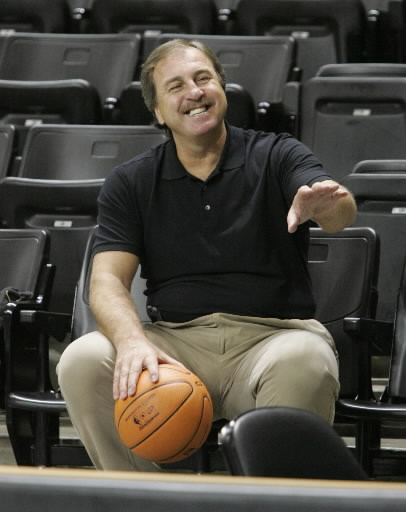 Cavs Archive
Cavs Archive  How the Wizards Affected the Cavs
How the Wizards Affected the Cavs

The Washington Wizards finally beat the Cleveland Cavaliers. They did not do it in the traditional way of competing on the hardwood for forty-eight minutes and seeing which team can put the ball in the basket more than the other. They are not very good at besting Cleveland in that sense. This time, they beat the Cavs by making a trade that will likely affect how Cleveland drafts.
The Wizards traded Rashard Lewis and the 46th overall pick for Trevor Ariza and Emeka Okafor. Why this is odd for the Wizards is that it is categorized as a "win now" move for a team that finished with only twenty wins, which is good for the second worst record in the NBA. What must be said is that Wizards GM Ernie Grunfeld has done a nice job of ridding the team of knuckleheads and players with questionable character. Having said that, he probably should not be making trades that should be reserved for teams on the cusp of the playoffs. The Wizards will be much improved from last year, but they are going to be paying Ariza and Okafor 42 million dollars combined in the next two seasons. Rashard Lewis' contract was partially guaranteed next year. In other words, the Wizards are going to be adding significant salary to be better, but not enough to really make an impact. Perhaps Ernie Grunfeld is on the hot seat or the team is attempting to make things better for John Wall. Whatever their intentions are, they are painting themselves into a corner of mediocrity.
The trade that the Wizards made today is the kind that will be discussed ad-nauseum by the anti-tanking brigade for the next year. On the one hand, the Wizards took on a lot of salary in order to have a questionable return. This is the sort of trade that proponents of tanking argue for. The Wizards will be much more entertaining to watch next year (unless you can't find entertainment value in this), but they have effectively removed themselves from having a high lottery pick and are certainly not a team that is in contention. Conversely, the Hornets traded away two players who can contribute shortly after earning the right to draft Anthony Davis. They will be accused of tanking by many people.
The trade that was made on Wednesday afternoon will affect the Cavs because it is almost a sure thing that Washington will select Bradley Beal. Considering that the Wizards now have Trevor Ariza, Chris Singleton and Cartier Martin at the small forward position and they have a big man rotation of Nene, Emeka Okafor, Jan Vesely and Kevin Seraphin, it is unlikely that they will be selecting Michael Kidd-Gilchrist or Thomas Robinson with the third overall pick. The Cavs, who were rumored to prefer Beal, will seemingly be selecting between either Andre Drummond, Harrison Barnes or Thomas Robinson. The best case scenario is that Michael Kidd-Gilchrist is still available when they draft.
What can lead to the best possible scenario would be if the Bobcats select Thomas Robinson with the second overall pick. This would take Anthony Davis, Thomas Robinson and Bradley Beal off the board. Because the Cavs selected Tristan Thompson with the fourth pick last year, it is not prudent to select multiple undersized power forward in the lottery in back-to-back years. Choosing between Barnes, Kidd-Gilchrist and Drummond is a lot more appealing than Robinson, Barnes and Drummond. In addition, Tristan Thompson will have to imrpvoe drastically to be considered a long-time starter in the NBA. No matter how poor a draft is, it does not bode well when a backup power forward is selected fourth overall.
If he is available, Michael Kidd-Gilchrist is the obvious pick to make for the Cavs. Kidd-Gilchrist is a gritty player who does all of the little things to help his teams win. Other than his broken jump shot, he is a complete player. Kidd-Gilchrist is a very nice consolation prize and most Cavs fans would be thrilled to retain his services. The problem with drafting Kidd-Gilchrist is that the Cavs need guys who can score and that is not his game. Kidd-Gilchrist averaged 11.8 PPG, 7.6 RPG and 2.0 APG in his only year with the Kentucky Wildcats. He converted on 49.1% of his field goals but shot a sub-par 25.5% from the college three point line. His offensive limitations would be an issue and the Cavs would likely find themselves in the lottery again in 2013, but there are certainly worse potential outcomes. If this is to happen, it is important for the Cavs to focus on acquiring offensively-gifted players in the upcoming season.
- NBA Announces 2013-2014 Schedule
- Browns Ink Sharknado
- Sharknado A No-Show For Rookie Camp
- Trent Richardson Out Until Training Camp
- Browns Sign Brandon Jackson
- Carrasco Suspended Eight Games
- Browns Add to Wide Receiver Depth with David Nelson
- Browns Need to Learn from Past Draft Mistakes
- Browns Release Chris Gocong and Usama Young
- Browns Missing on Grimes Disappointing, But Not The End
The TCF Forums
- Movies coming out
rebelwithoutaclue (Tuesday, January 21 2014 12:56 PM) - 2015 Recruiting
jclvd_23 (Tuesday, January 21 2014 12:38 PM) - The 2014 Offseason Thread
Larvell Blanks (Tuesday, January 21 2014 12:25 PM) - Official- Browns Coach Search/Rumors
Larvell Blanks (Tuesday, January 21 2014 11:53 AM) - Chris Grant's first 3 drafts
Kingpin74 (Tuesday, January 21 2014 10:13 AM) - Mike Brown
YahooFanChicago (Monday, January 20 2014 11:15 PM) - 2014 Hoops Hockey Hijinx
jpd1224 (Monday, January 20 2014 4:44 PM) - 2014 Recruiting
jclvd_23 (Monday, January 20 2014 2:26 PM) - Wish List - #4 Pick
Hikohadon (Monday, January 20 2014 1:26 PM) - #1 overall pick Anthony Bennett
TouchEmAllTime (Sunday, January 19 2014 1:28 PM)


